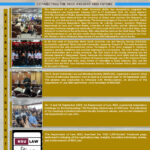Effectiveness of Martens Clause for Protecting Natural Environment in the International Armed Conflicts

The term ‘natural environment’ should be understood in the widest possible sense in the international armed conflict. The Commentary of Article 55 of AP – I explains that the concept of the natural environment should be understood in the widest sense to cover the biological environment and includes everything that is not man-made but it is atmosphere, the air, the ozone layer water, soil, plants and animal. War has always had a negative impact on the natural environment. Natural environment directly or indirectly is a causation of armed conflict. As occurred in Vietnam War 1961-1975, Gulf War 1991, Kosovo War 1999, Iraqi War 2003 and Israel-Lebanon War 2006. Environmental harm as repercussions of war or armed conflict is typically caused by methods and weapons mistakes. The relevant treaty law pertaining to the preservation of the natural environment during international armed conflicts is confined to the prohibition of damage of an extreme sort and scale that has not occurred so far. Specific treaty legislation on the protection of the environment in non-international military conflicts is completely non-existent. On the other side, international environmental law is applicable in peacetime to increase natural environment preservation during armed wars.
Martens Clause is a very essential clause owing to the importance of principle of law and international customary law which is recognized by the civilized nations, the laws of international armed conflict not only rely on written international law in terms of international agreement. Martens Clause governed in Additional Protocol I of 1977 during armed conflict situations. Article 1 paragraph 2, stated that in cases not covered by this protocol or by other international agreements civilians and combatants remain under the protection and authority of the principles of international law derived from established customs from the principle of humanity and from dictates of public conscious. If there is a gap in the legal framework of international relations which controls particular circumstances connections of armed conflict and environment, Martens Clause said that states have to meet the minimal standard established by humanity and public conscience. Martens Clause typically believed to create basic concept of international humanitarian law and essential principle which preserve the environment if there are no rules in agreement or custom. The main basis of international humanitarian law are principles of distinction, military necessity and proportionality. All of these ideas have ties with natural environmental protection during armed conflict.
If the Martens Clause has relevance for the establishment of customary international law this is all the cases in respect of broad principles of law which is mentioned in Article 38 (1) of the ICJ Statute as ‘…recognized by civilized nations, acknowledged by States as applying to their international relations and applied with this understanding in the jurisprudence of the ICJ.’ Given that humanity and the demands of public conscience are crucial for the application and continued development of other laws, the Martens Clause may become especially relevant for comprehending the fundamental principles of international humanitarian law.
In the 1972 Stockholm Declaration’s Principle 21 and the 1992 Rio Declaration on Environment and Development’s Principle 2, States there were initially obligated to refrain from harming the environment of other States generally. Despite the fact that both tools might be seen as embodying fundamental legal principles due to their positive nature and widespread acceptance.
It may be emphasized that there is a specific relevance of the Martens Clause for implementing measures of prevention and precaution that are particularly vital for the protection of the natural environment in relation to armed conflicts. This does not only apply to problems of proportionality in assaults but also to essential steps to be taken in planning and conducting military actions harmful to the natural environment and shall be minimized as long as the latter is a civilian object. These ideas may and should be utilized to understand and implement the Martens Clause. It may be necessary to take a number of safeguards during an assault since proportionality requirements are not explicitly stated in international law. If human needs and moral principles are properly taken into account, the function of precaution will be better understood and it may then be implemented more effectively. The Martens Clause is used by military strategists and commanders to better prepare them for responsible conduct.
The International Law Commission’s (ILC) ongoing work on the protection of the environment in connection with armed conflict serves as an excellent instance of this. It comprises a collection of proposed principles and provisions that were adopted in 2019 and that are generally based on fundamental rules and clauses of international humanitarian law, environmental law, and human rights law, as well as significant environmental considerations. It may be anticipated that this draft principle would rekindle debate on the issues, promote flexible interpretations, and, most crucially, prompt states to take the necessary measures to address areas of uncertainty in current legislation. The Martens Clause’s proper application will assist in filling up any gaps in treaty law without imposing additional responsibilities. To demonstrate the special challenge of safeguarding the natural environment during armed conflict in this context, three real situations instances may be highlighted:
Means and methods of combat must be employed with due regard to the protection and preservation of the natural environment. What due regard exactly means here must be interpreted and implemented. The task may be facilitated by the Martens Clause with its emphasis on the dictates of the public conscience.
In the conduct of military operations all feasible precautions must be taken to avoid and in any event, to minimize, incidental damage to the environment. While the customary rule does not specify what is feasible to avoid and in any event to minimize incidental environmental damage, the Martens Clause may help to develop appropriate standards in practice.
Launching an attack against a military objective that may be expected to cause excessive damage in relation to the direct military advantage anticipated is prohibited. An application of the Martens Clause in light of its relevance to strengthening the responsibility towards future generations may offer appropriate standards of behavior in such cases.
In above that circumstance particular military behavior will be necessary that goes beyond the more fundamental standards of proportionality and avoidance of civilian collateral harm. The Martens Clause may help with adequate planning and execution. It should also be recognized that, in case of uncertainty whether a legal requirement already exists the application of the Clause may result in a voluntary practice to attain such an objective.
Finally, it comes to the conclusion that the Martens Clause may and should be utilized to resolve ambiguities in the law relating to military activities by States and non-State entities during armed conflicts. The Martens Clause has a bearing on how the current gun control laws are interpreted and carried out. Therefore, it affects all parties to an armed conflict to fill legal gaps caused by the ambiguity of relevant treaty law. This endeavor necessitates not just reconsidering pertinent treaty clauses and customary laws, but also investigating broad legal concepts and creating best practices for military operations. In the end, the Martens Clause could help with the application of current standards and guidelines for evaluating fresh advances in international humanitarian law.
Saaif Rasul1 Posts
The author is currently pursuing his Master of Laws from Bangladesh University of Professionals. He participated in 21st Human Rights Summer School organized by ELCOP. Besides that, he has been working as an apprentice lawyer in the District and Sessions Judge Court, Dhaka.


0 Comments